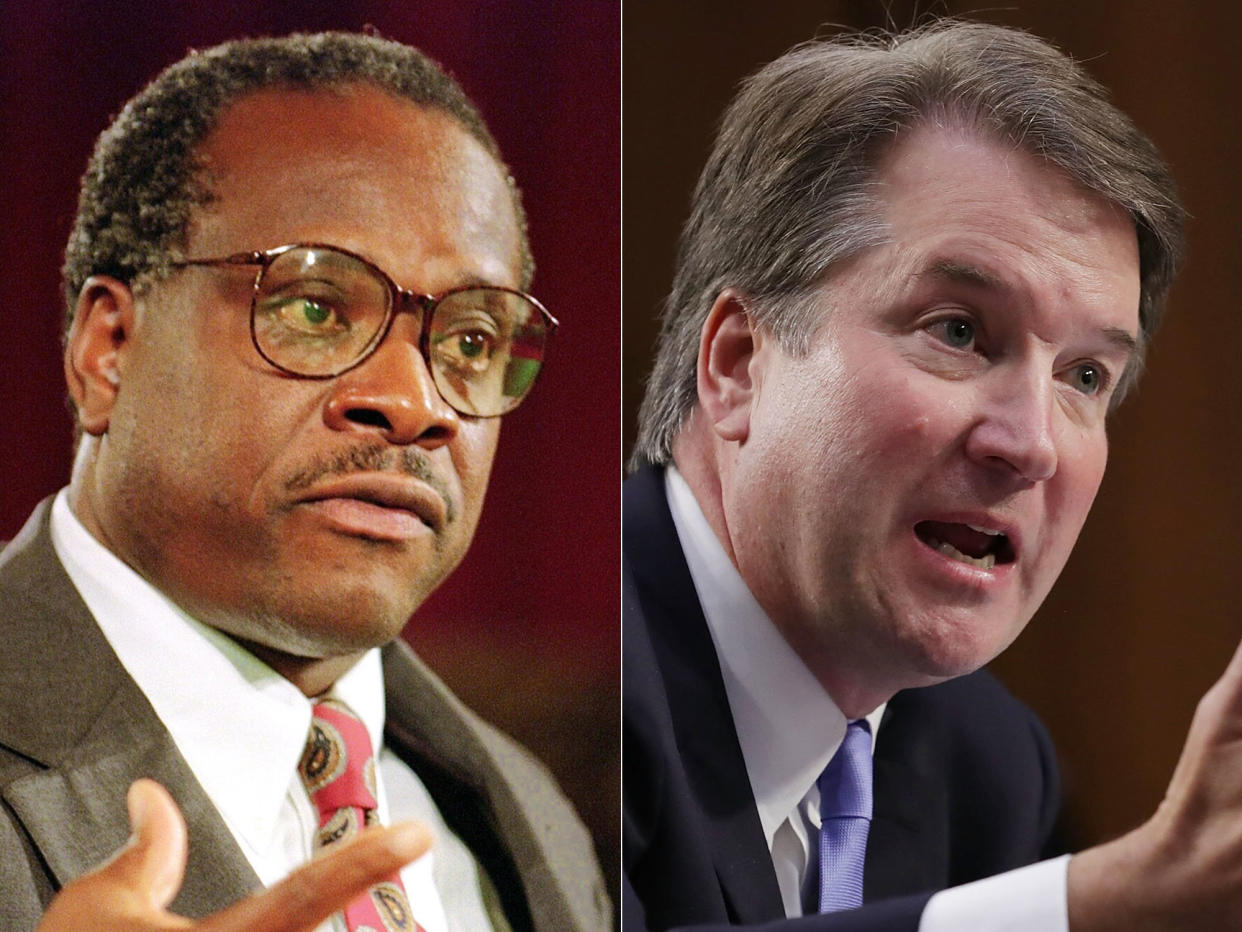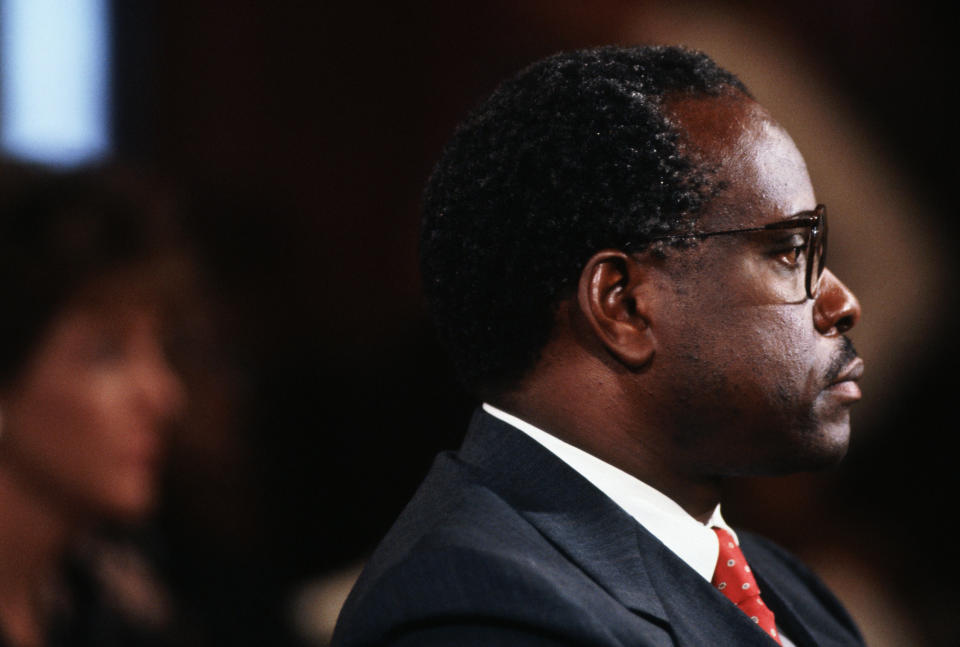Opinion: Clarence Thomas Was A Tool. Brett Kavanaugh Is Useless.

In 1991, even before his confirmation to the U.S. Supreme Court, then-Judge Clarence Thomas was a tool.
When Anita Hill, who had previously worked for Thomas, testified to the Senate Judiciary Committee that he’d sexually harassed her several times, he indignantly denied it. His conservative supporters relished the opportunity to both dismiss the narrative of rampant workplace harassment and be seen publicly supporting a black man ― albeit one who was cut from the same ideological cloth as they were.
Thomas’ characterization of those hearings as a “high-tech lynching” was, perhaps, the most significant development in the confirmation process. Invoking race proved a boon for Thomas and those who backed his nomination, diverting at least some attention from the embarrassing details of his alleged sexual harassment to the perceived injustice he faced in being asked about them.
Twenty-seven years later, certain aspects of Judge Brett Kavanaugh’s nomination to the Supreme Court bear a striking resemblance to the Thomas nomination. Kavanaugh, whose confirmation seemed a foregone conclusion until allegations surfaced of an attempted rape during his teenage years, is now preparing to testify in a public hearing also featuring the woman who has accused him, Dr. Christine Blasey Ford.
But where Thomas’ perceived lack of privilege as a black man served him mightily in the public eye, Kavanaugh’s wealth of privilege as a well-to-do white man will, ironically, make him more vulnerable to failure.

Amid allegations of sexual harassment, Thomas was able to personally associate himself with a trauma familiar to many black Americans: the experience of being unfairly targeted. At the time, the conservative machine ― which included politicians and media figures ― was eager to embrace this defense, despite their strident denial of racism as a prominent factor in black American life prior to the Thomas nomination.
The strategy of inverting Hill’s accusations in this way, and making a righteous accuser out of the accused, turned Thomas into a revolutionary black martyr pitted against his liberal enemies and hoisted him onto the Supreme Court bench, where he has sat ever since.
Brett Kavanaugh will need to rely on a different playbook.
The specter of race was, in fact, always present in the nomination of Clarence Thomas, even before he conjured it in his own defense. By choosing Thomas to fill the seat vacated by Justice Thurgood Marshall, President George H.W. Bush had seemingly selected a retributive heir to Marshall’s legacy. Marshall was a civil rights icon and the court’s first black justice, while Thomas, his career forged in the conservative establishment, was the ideological opposite. If Marshall’s presence on the bench represented a glimmer of light to blacks hoping for social justice, Thomas’ nomination and the hardening of the high court’s conservative majority stamped out that light in a matter of months.
During the same year Congress passed valuable civil rights legislation, the Senate elevated a black man to the Supreme Court who could be used as a cudgel to blunt the law’s impact. Thomas’ nomination defied several civil rights organizations and delighted their many foes, who championed the nominee’s black conservatism as noble.
This was Thomas, a vocal opponent of affirmative action, simultaneously existing as its greatest beneficiary. And were it not for Anita Hill coming forward, his confirmation might have proceeded seamlessly.
But reporting from 1991 reveals that observers were skeptical that a black woman’s suffering would rise to the level of national outrage. They were proven right by the polling: In numerous surveys taken after Hill’s testimony, more than 50 percent of Americans were in favor of Thomas’ confirmation. Among blacks, that number ballooned to 70 percent.
Perhaps the most sobering reflection on the widespread support for Thomas despite the gravity of Hill’s claims came from political science professor Linda Faye Williams, who remarked to the Chicago Tribune, “No black man has ever been lynched for doing anything to a black woman. They’ve been lynched for doing things to white women.”
Brett Kavanaugh will not benefit from the perfect storm of circumstances that helped Thomas. And without that, Kavanaugh’s elevation to the Supreme Court is less secure.
Firstly, the woman who has accused Kavanaugh is white. Though we do not yet know how much sympathy she will be afforded by the public following her testimony (should she choose to share it), Christine Blasey Ford will have the relative luxury of knowing that she won’t be categorically disregarded in the way a black woman would be.
Secondly, the public’s assessment of Kavanaugh will differ from that of Thomas because he is white. In fact, he is very white. He is not just “I have black friends” white. Literally, he is “my mom once taught black kids” white. Unlike Thomas, nothing about Kavanaugh or his life will animate Americans around cynical claims that he faces discrimination.
Love HuffPost? Become a founding member of HuffPost Plus today.

To put it plainly, Brett Kavanaugh is a throwaway candidate in a way that Clarence Thomas was not. His nomination doesn’t represent anything that couldn’t also be represented by any number of other extremely conservative judges. He was not, like Thomas, plucked from America’s lower caste and given the power to keep that caste at bay.
Instead, he was granted power and privilege at birth, only to bungle it through potentially perjurious hearings and the revelation that he may have tried to rape someone once.
There aren’t bootstrap stories about Kavanaugh’s grueling ascent from the wealthy community of Bethesda, Maryland, to the halls of Yale Law School. There is no captivating tale of the privileges that eluded him, the opportunities that systematically passed him by.
There is just Brett Kavanaugh. And while Republicans yearn for another conservative justice to roll back legislative accomplishments made over the past century, there is no actual reason — politically or otherwise — that Kavanaugh has to be that guy.
Brett Kavanaugh, the individual, is essentially useless.
This article originally appeared on HuffPost.

